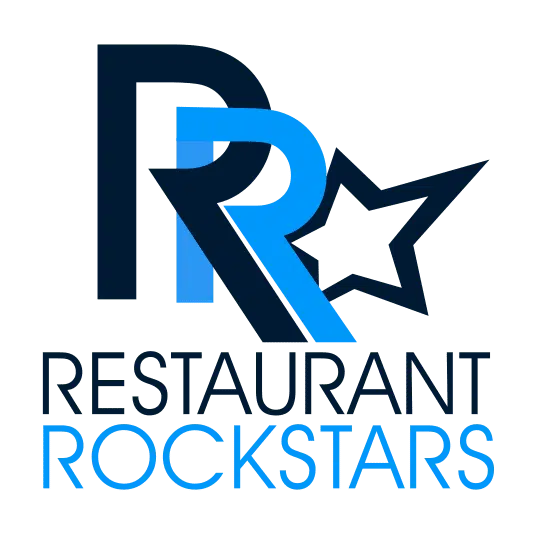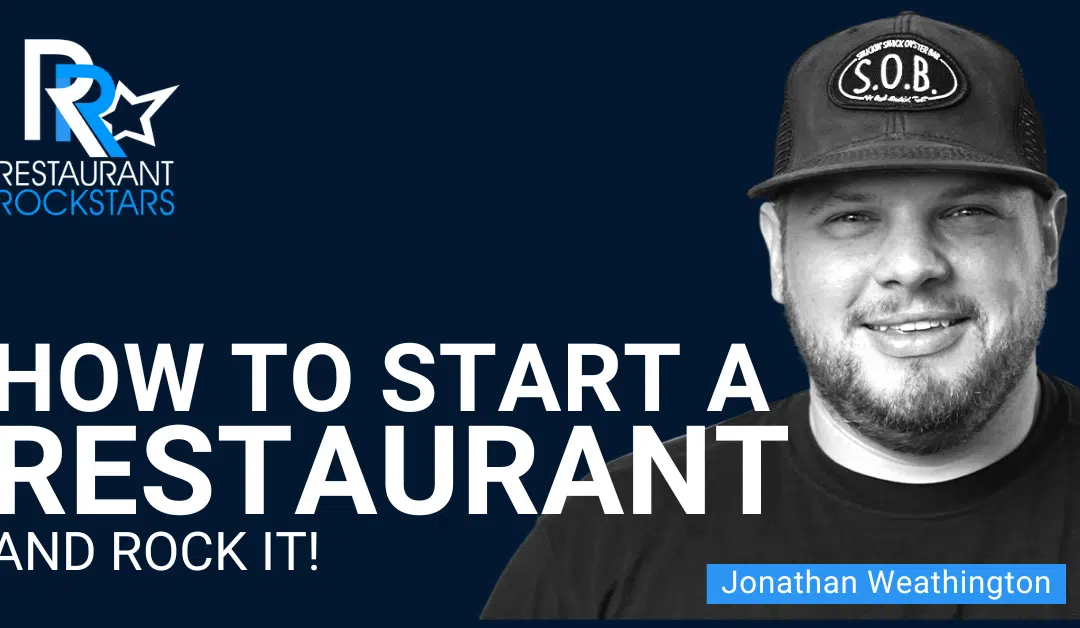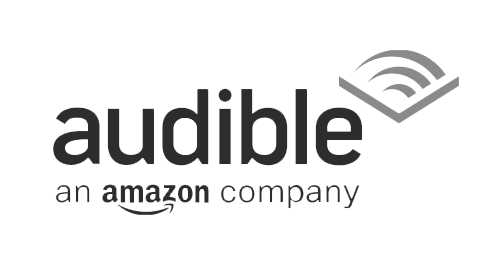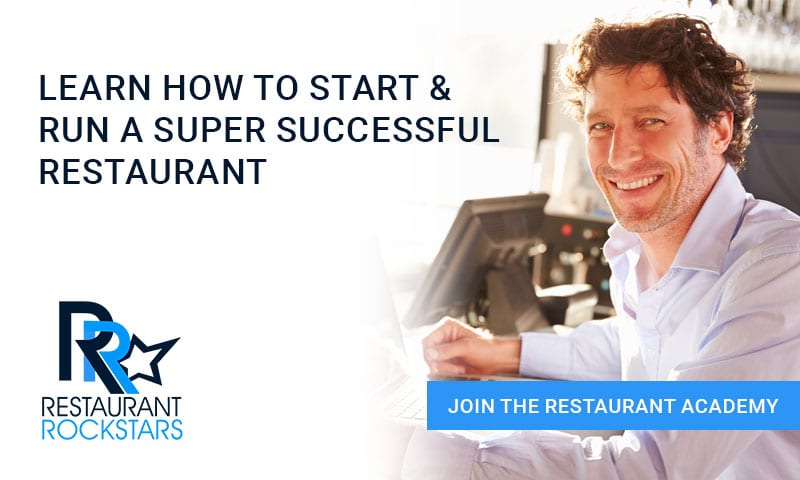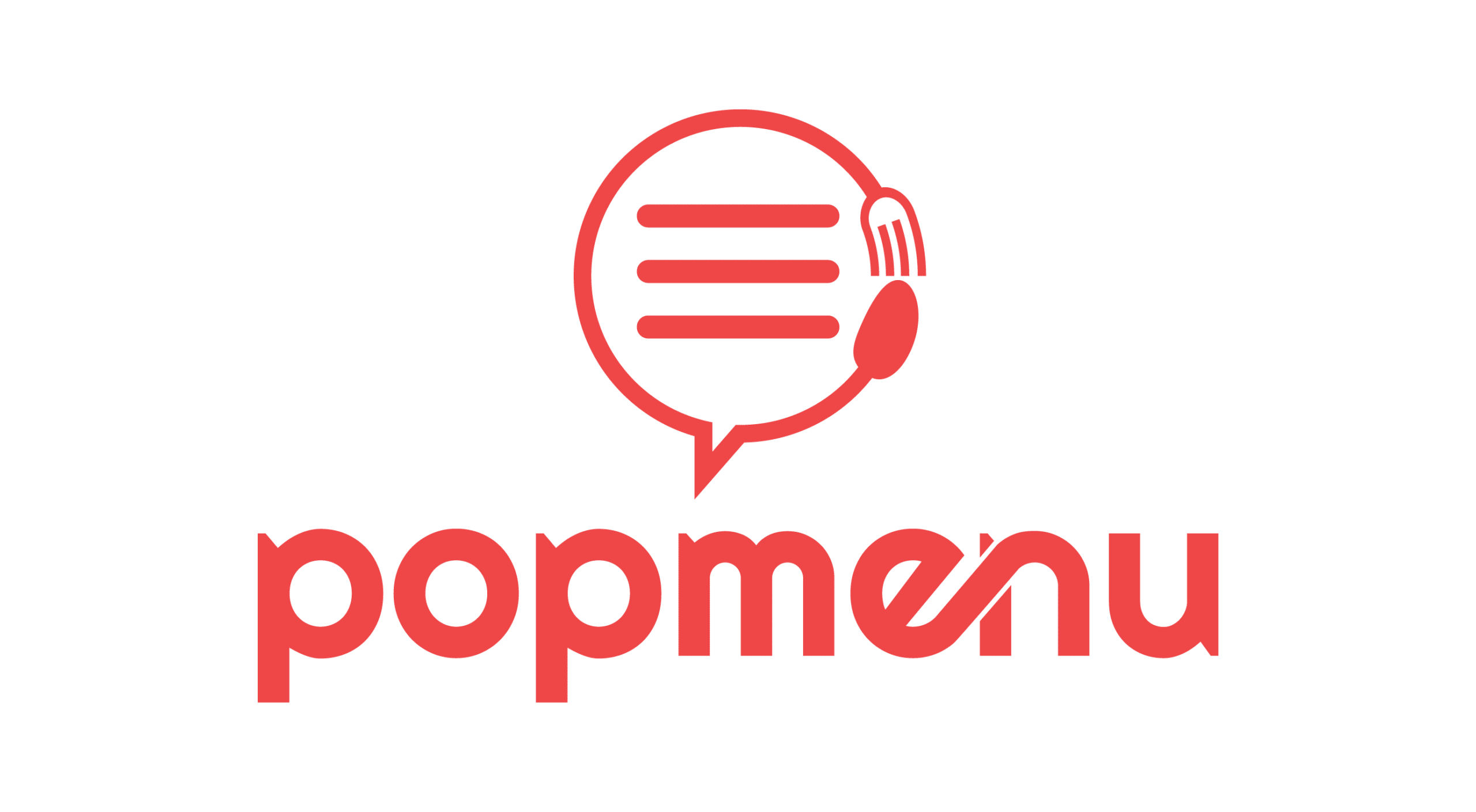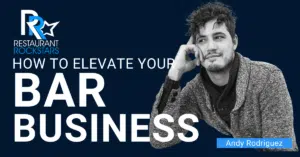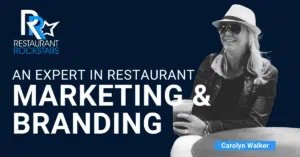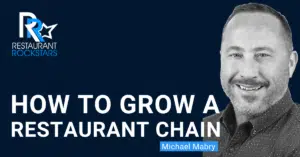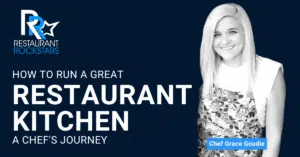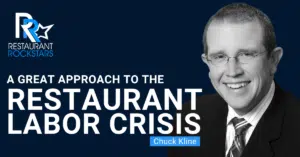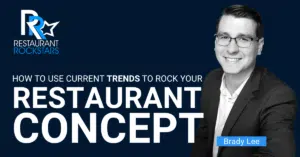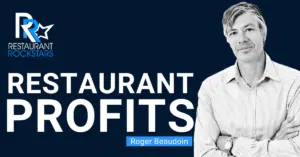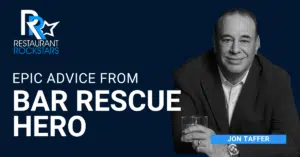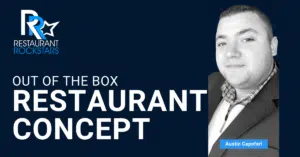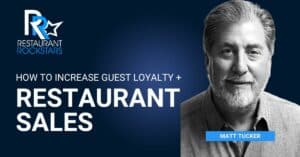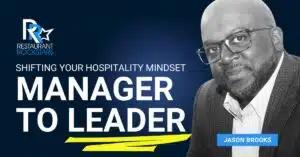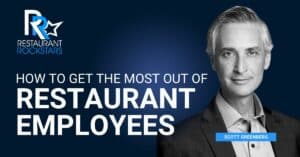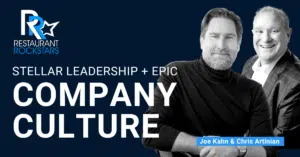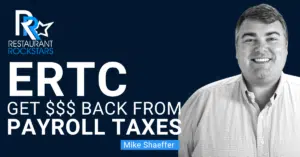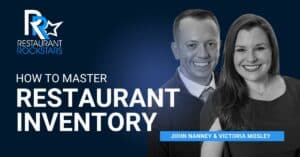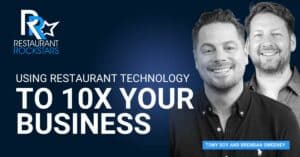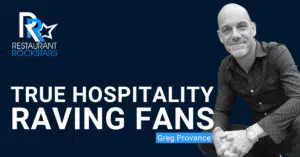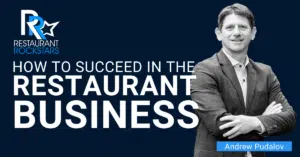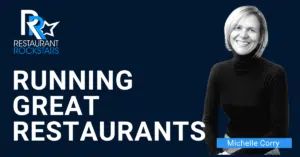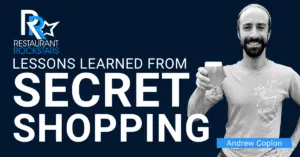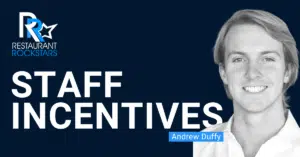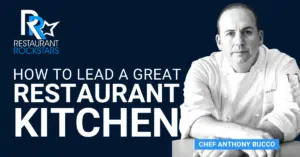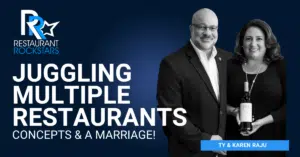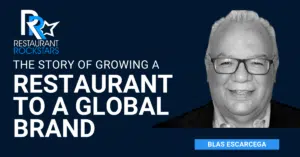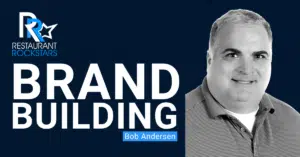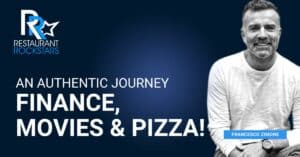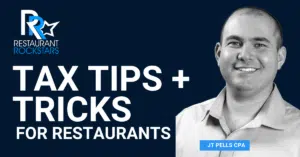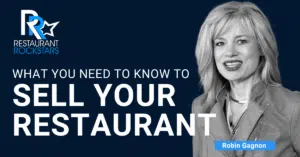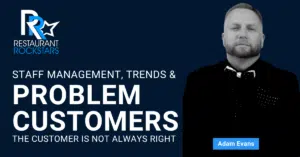Restaurant Rockstars Episode 328
How to Start a Restaurant and Rock It to Several!
LISTEN HERE OR ON YOUR FAVORITE PODCAST PLAYER
Prefer to watch the interview?
Click the video below.
Many of us had a dream to start a restaurant.
How many of you started your restaurant with just a dream and no experience? How many of you want to start but don’t know where to start? This is your episode?
In this episode of the Restaurant Rockstars Podcast, I’m speaking with Jonathan Weathington, the CEO of Shuckin Shack, a super cool Oyster and Bar concept.
Childhood friends had an idea to start a restaurant with the goal of “just staying open”! Sure, there were mistakes and experiments along the way, but now that that place has grown to 19 places, they’re still open and opening more.
Listen as Jonathan tells us:
- Why his founder friends made him the CEO
- The moves he’s making to grow this brand and concept
- How company culture and the Vibe of Shuckin Shack are one and the same
- Why you should put your guest hat on when you walk through your door
- How innovation and creative ideas not only benefit community causes but are also powerful marketing
- The emphasis on Service and how onboarding and training create guest loyalty
- It’s as simple as “treat people right and they’ll come back”!
Jonathan shares his best advice on how to run a successful restaurants, what they are looking for in potential business partners and more.
Watch or Listen to this episode and then go out there and Rock YOUR Restaurant!
Roger
Connect with our guest:
https://www.facebook.com/ShuckinShackOysterBar/
0:00
Very simple. The restaurant industry as a whole is very simple. You have to do great food, you have to serve great beverages and then you have to treat people exceptionally well. People overcomplicated by bringing in all these outside pieces.
0:15
Thanks for once again, tuning in the podcast. Glad you’re here. This interesting episode is all about a story very much like my own. Couple of friends get together, they have a crazy idea to start a restaurant. They don’t have a lot of experience, but they figure it out. And they grow. And they make mistakes, and they learn. And now it’s 19 units, and growing even larger. This episode is all about that restaurant journey, what it takes to start a successful restaurant. And then most importantly, what’s the magic formula to really find success. They’ve certainly done it. You’re not going to want to miss the episode, my guest today, Jonathan Weathington, CEO of shuckin shack, an oyster bar concept. It’s great. You’re not gonna want to miss it. So stay tuned. Thanks. Also to the sponsors of this week’s episode works. Pop menu, SRV the hospitality training app, and the Restaurant Rockstars Academy. Now on with the episode.
1:11
You’re tuned in to the restaurant rockstars podcast powerful ideas to rock your restaurant. Here’s your host Roger Beaudoin,
1:26
Restaurants have been hit hard the last few years, which means restaurant owners and staff are working harder than ever. Trying to meet the demands of in person hospitality can be really demanding, which is why I recommend popmenu answering popmenu answering turns every phone call into an opportunity. It uses artificial intelligence to answer the simple questions that are tying up your phone lines like can I make a reservation or where are you located, and over 50% of restaurant guests are happy to have their questions answered by an automated system. Within the pop menu platform. You can customize answers for your restaurant and choose the voice your guests here, and even send follow up links via text message. Popmenu answering picks up your phone 24/7 365 days a year allowing you and your team to focus on what matters most pleasing your guests, prevent lost customers and impress your guests with popmenu answering. And for a limited time my listeners can get $100 off their first month plus lock in one unchanging monthly rate at popmenu.com/rockstars go now to get $100 off your first month and learn more about popmenus full collection of tools at popmenu.com/rockstars rock on
2:47
Restaurant owners and managers Listen, it’s not too late to claim your employer retention credit. But you have to act soon. If you haven’t heard of this, your business can receive money back from the IRS money you’ve already paid in payroll taxes. Nothing you do today is more important. Now this is free and clear cash that your business is owed by the government, the ERC program is available if your operation had 500 employees or less, you had to shut down or partially suspend your business or you had at least a 20% decrease in business due to COVID 19. During any quarter of 2020 and the first three quarters of 2021. Now your business can get up to $7,000 per employee per quarter for 21 and up to $5,000 per employee in 2020. Now if you have just 10 employees today and meet the requirements, you can receive up to $260,000 back in a refundable tax credit that you don’t have to pay back. Now the faster you apply, the quicker you get the money but you must do it soon. You can use the money for any purpose payroll cost of goods, business improvement or other expenses. Again, you don’t have to pay this money back. Now Whirks is a company that will do everything for you to get the money that you’re owed. Now I’m speaking from experience with works. My restaurant receives big checks in all available quarters and works people and process made it easy for a no obligation consultation. Click the link in the show notes to this episode and speak to them with no obligation. You pay nothing until they get you the cash back.
4:28
Hey, welcome back, everyone. This is the restaurant rockstars podcast. And with me today, Jonathan, welcome to the show today. Jonathan, how are you? I’m great, Roger, thanks for having me. Fantastic. Glad to have you here. So we’re talking about a brand called shuckin shack and I’m really interested in the history of this brand when it was established and who created it and what the vision was tell us the whole story. Sure. So check and check was started in 2007 by two friends mapping
5:00
And then Shawn Cook, and they were 20 Somethings living in a beach town and they wanted to start a bar. That was that was the, the, I guess the founding story. It’s not all that complicated in the sense that what 20 year old guy doesn’t want to start a bar in a beach town. So that was the, that was the that was a short and sweet version of it. That’s fantastic. What Now that’s cool. Did it start out with humble beginnings was an overnight success. Like let’s talk about the first store and how it became a franchise and how it grew. But let’s start with the very first store, like tell tell us, let’s dive a little deeper into that. Because, you know, everyone in this business has a vision or an idea or a passion for what they want to, you know, achieve the whole concept. You can see sometimes miles down the road before you even open the doors. And I’m really curious, besides just a bar in a beach town, I’m sure it goes far deeper, give us a little bit more meat. Sure, there’s a little bit there’s a little bit deeper story to it. But as far as miles down the road, it was more like looking hours ahead instead of miles down the road. At the time, the the two friends that shard started it Matt and Shawn, I knew them when the when the concept was started. I’m not a founder of the brand, obviously. But their goal was just to stay open. I think most they had never been in the restaurant industry before and never been in the bar industry before. Matt was really the only one with a little bit of experience, he had worked a couple of weeks as a barback at another bar. And that was it. No hospitality experience whatsoever. And so they opened the bar simply with the hopes of staying open. And their thought process was was quite simple was that, hey, if this fails, we can go back to our day jobs. And so that I think that innocence and that, that really desire just to do things very simple has been one of the lead factors of our success. And so as the location grew, the first location is only 960 square feet, it’s it’s still there today, we have not expanded at all. It does incredible volume, we have an incredible customer base that repeat customer, wildly loyal businesses grown every single year in that location. But that first location, very humble beginnings, they built the location themselves that neither of them came in with financing. So it was personal funds and borrowing money from family and friends, and started the start of the concept with one simple goal, which was to stay open, which make no mistake about it. When when you open a restaurant, I think many people have delusions of grandeur, and oh, we’re going to open multiple locations, we’re gonna franchise eventually we’re gonna make millions and millions and millions of dollars. That was not their goal. Their goal was how do we get through this week? And so I think taking things, chunk by chunk or byte by byte, if you will, was was what has led to a lot of the success of the concept and that we don’t we don’t out kick our coverage. We try to make sure that yes, of course, we’re goal oriented, but at the same time that we’re running a great restaurant, and first and foremost treating our customer base exceptionally well.
8:16
I love that story. And I can so relate to that, Jonathan, it’s very similar to my own. And if we were to go back 30 years in time, you know, I was in my 20s. And I had an idea and a vision and very, very limited experience. I was a bartender when I was in high school. And that was it. And I started my first concept and grew it to multiple concepts. And you know, that’s my backstory. But again, very similar to this one. So thanks for sharing. I think that’s totally cool. So let’s talk about that first store. You mentioned it was a bar, did it serve food right from the get go? Where did that come later? It did it did serve food right from the get go.
8:55
I think the original design the first location, when you walk in the bars, the first thing you see it’s on the right, it’s very small. And so obviously everything is pretty compact. And going back into the design of the location. When Matt and Shawn built it, their thought process was to save on labor. Let’s have a bartender that can also run to the kitchen if they need to. So yes, there was food there. But I think the initial opening of it was we’re going to open a an oyster bar or a dive bar that serves great food. And all of a sudden our food sells out outpace our alcohol sales. But yes, there’s always been food there. And it’s always been kind of a hallmark of what we’re doing but more of in a bar atmosphere as opposed to traditional restaurant atmosphere.
9:39
No kidding. That’s, that’s terrific. You know, there’s a similar place. I’m on the coast of Maine here and there is a very similar Well, again, I’ve never been to a shocking shock. I’ve got a pretty good idea based on your website of what the vibe is and the ambiance and we’re going to talk about that. But there’s a very similar concept here on the waterfront in Portland, Maine. And it isn’t Oh,Oyster Bar, but you would you would identify it is a bar, a dive bar that serves good food. And that’s the, that’s the cachet of it. You know, it’s like, yeah, it’s not something that you’d ordinarily walk through the door, unless you heard about it got a recommendation about it. But then once you’re there, the vibe kicks in. You’re a local, even if you’re a tourist, and it’s like this rocket bar that serves great food. So that’s, that’s tremendous. So let’s talk about so shuck and check the name was it always called shuckin shack, were there any evolutions? Did the name chang? Or did it always always been shuckin shack,
10:40
I think I think that name actually came a little bit later to the game, I was not I mean, I was around when the concept was founded when they were trying to figure out a name. And it actually came from one of our friends, girlfriends, who they were sitting around one night and trying to think of names as people do while they’re consuming. And they just sat around and said, I don’t I don’t remember exactly who came up with it first. But they tossed around the name and said, Hey, that sounds kind of neat. It’s catchy, you know, with the alliteration. It rolls off the tongue very easily. And we can play around a lot with it. If you look at our website and look at some of our apparel, our initials are s s, o v. And so we can play around with the sob and that that’s really, really defining for us as a brand. Because we’re literally a little off kilter, at times, we walk that line between what’s acceptable and what’s not acceptable, that’s a big part of our brand feel and look, a little bit of a reverence here and there a little bit of an edge. It’s like, that’s part of your branding and your marketing. And that makes total sense.
11:49
I get that, especially in the communities that you serve, you know, the beachy vibe, all that kind of stuff. That’s tremendous. Did you tell me what year it was started when When was that 2007 was the first location and then we opened our second location in 2012. And then we started franchising in 2014, but didn’t open any new locations until the middle of 2015. So all of our growth has really come post 2014. When did you join the brand, Jonathan,
12:19
I joined officially in 2014. So I helped them build the second location in 2012. I work construction and help them build the second location. And then they I was working for another company, Fortune five fortune 100 company, actually. And I had gotten to the point in that company, I really love that company loved working for them had had a great track record there. But I’d gotten to the point where I had kind of tapped out of what I was going to do. And so they called me in early 2014 in February 2014, and said, Hey, I think we’re going to expand, and I think we’re going to do it through franchising. And while you don’t have a lot of franchising experience, you’re gonna probably have the most franchising experience, because you work for franchisees, which is also an important aspect of it. We think you fit in the growth of this, do you want to come help us do this? And I said, Absolutely, let’s do it. I love it.
13:14
That’s fantastic. So let me ask you the original concept, we’ve sort of created a picture in the guests mind of, you know, the 900 square foot dive bar with Greek food right from the start and all that sort of thing. Now, obviously, the size of the locations have expanded. Now, what’s a typical size? Now? I mean, does it vary? Or does it stick to a code or a formula?
13:39
Sure, it does vary, none of our no two locations in our system are the exact same size or layout, we try to create unique spaces and every single city that we go into, make no mistake, that’s the longest road. Because we are we are taking we’re designing individual locations based upon the spot that we’re leasing. And so we don’t we do have a quote unquote, prototype. But we haven’t ever used that prototype in the sense that this wall is exactly where the prototype says it is. And this piece of equipment is exactly where the prototype says it is. Our average size, and now was about 25 2700 square feet. So we have locations as large as 3300 square feet, and of course, the small is 960 square feet, but our medium and our average range and about the 2700 square feet range. Okay, so they’re all unique in terms of size, and even while the concept, of course is consistent, but they’re all sort of unique in their own way.
14:38
They’re in different locations, do they pay homage to the community in any way with memorabilia of any of that sort of thing. I guess what I’m asking is, I want I want us to put our sort of guest hat on is if we’re a new customer for the very first time and we’re walking out the door. I want you to describe what I what we see and what we here and what we feel and what’s that vibe? Like, if you could give us that, that’d be awesome.
15:06
Sure, the vibe in one word is authentic. That’s the most important pillar of what our vibe is. Because no, no two locations are exactly alike. The vibe and each location might be a little bit different dependent upon where it is located. We were very intentional in creating and growing our brand in the sense that we want you to walk in to your location in Portland, Maine and say this is shuck and shack Portland, this is not a shuck and shack in Portland, this is shuck and shack Portland. So we want to make sure that it ties into the local community. That’s a big part of the local community. It should feel like an independent restaurant. That’s one thing that we worked very hard at I have even as the CEO and you know, kind of leader of the growth of the company. I have no desire to have an atmosphere that says, Oh, this is just another shucking shack, we want it to feel like an independent so that when someone walks into that restaurant in whatever city, it may be located. Their first thought is, oh, cool. I, I’ve never seen one of these before. Or, Oh, this must be an independent restaurant. There’s the owner standing at the bar right there, I got welcomed in. I wasn’t said I wasn’t told welcome to check and check. I got told to sit down and have a seat and I’ll be with you in a second to get you some variance. We we tried to create an authentic product. That’s the hallmark of exactly who we are as a brand. And that I can keep going that emanates through our customer service philosophy, which is have authentic conversations with people we don’t have shields, a lot of restaurants such fields. Can I you know, is it two for lunch, we can sit you right here. What would you like to do? Here’s our specials, here’s our drink specials, here’s our happy hour. What would you like from the bar and upsell you on this? Would you like a dessert? Would you like this? Can I grab a t shirt? How about gift cards for the holiday, we don’t have any interest in any of that. A vast majority of the time when people walk into your restaurant, they know what they want. And these days, they’ve looked at the menu online, they generally know what they want. It’s your job to create an authentic experience for them and give them exactly what they want. And so that’s what we do. Awesome. Fantastic. That sounds great. So what a fun environment, right? It’s like, it’s the kind of thing where you’re delivering hospitality in an authentic way. But you’re also giving people sort of an escape from their day to day routine, and you’re walking in, and suddenly you’re part of this, you’re part of something bigger than yourself. And it sounds like just a whole tons of fun to walk in the door. It’s a lot of fun. I mean, I wouldn’t be doing it, if it wasn’t fun. There’s, we do have a lot of fun in our support center in our corporate office, so to speak. And that’s because we’re allowed to be our real selves, you know, not only on the leadership team, but also the franchisees and every one of their employees, we can consistently get feedback from our employee base that they love working for us, because they’re allowed to be themselves, they come as they are, it doesn’t matter. I mean, for the most part, it doesn’t matter what their dress like, you know, if you’ve got tattoos, so whatever you want to dye your hair, do it, it doesn’t matter. We don’t really have a whole lot of standards, we’re not we’re not interested in turning people into robots. And something I say throughout every training is that we want you to be the person your grandma thinks you are. And that person is your best self. And whether that’s showing up in whatever you want to wear as far as the shark attack t shirt is concerned or really with with the best attitude that you can have and treat our guests that way. That’s exactly what we’re after. We have no interest in turning people into this assimilated version of a human being that spouts out directions and turns into a robot the second they go to a table, we have no interest in that
18:54
you’re experiencing really solid growth. So I guess I’m curious, what’s your secret to success? What’s the magic formula that really is a competitive advantage for shucking shack?
19:07
Sure, and this is gonna sound absolutely asinine to many people because I think Tech has taken over the thought process of restaurant growth. Our secret to success is that we treat people well. That’s it. That’s it, you treat people well, and they will come back no matter the amount of marketing that you do, no matter the amount of social media that you do, or SEO or pay per click or, or ads on the internet or any of all that baloney. Certainly you have to play that game and certain aspects and growing your brand. But great operations is your best marketing tool. And when you have great operations and when you treat people exceptionally well, they will tell other people and then subsequently they will come back and bring their friends. That’s how you build a brand. Excellent. That’s great advice. Let’s shift gears a little bit. Let’s talk about you’ve got this sort of charitable aspect to your business.
19:59
Since you did something called the freshman rock tour that covered a whole lot of ground and a whole lot of states, and that’s awesome. Tell me about that. Sure. So because we are kind of a fun brand, we don’t have a whole lot of guide rails or guardrails rather and what we do, we put on a fresh enroll tour from September 22, October 22 last year, and that fresh enroll tour was basically a singer songwriter tour, we hired two musicians out of Nashville, Warren Garrett and CJ Soler. And they went to every single one of our locations and did a live music performance. We also implemented local artists. So we had local singer songwriters in each location that were from the actual area where they were performing. And we had tour dates, we came out with a tour t shirt, just like you might see an old guns and roses or Def Leppard t shirt, we had a tour t shirt, they performed at every single location in every single location raise money for the Leukemia and Lymphoma Society, which is something that’s very, very near and dear to us. We have several people in our system that have had leukemia or lymphoma that are so obviously, that’s something that we’re very passionate about. But we raised almost $53,000, in 30 days for LLS, which is something where we’re super proud of that. That’s, you know, for us it was, we wanted to do something that was both fun for our customer base fun for our franchisees and employees, but also beneficial and was a great cause. And so that’s exactly what we do.
21:30
So that’s just a great example of giving back to the local communities and raising money for a really noble cause. So the whole idea is really noble. And that’s why you did it, of course. But now it’s become this sort of signature marketing idea that every year we’re going to do something, will it? Will it stay that concept? Or will you come up with new ideas? And will it be the same cause? Will it be different causes like, here’s a real, you know, thing that hang your hat on that people can relate to that they’re going to want to give to for all the right reasons, of course, tell us about future charity for sure.
22:07
So you got a couple of questions. The first will that be the same calls are different calls. The first thing is our overall beneficial calls is Leukemia and Lymphoma Society. Now that being said, individual locations as a part of actually as a part of franchisee training as a part of the onboarding process, individual locations, choose a local charity. And so while we have an overarching charity of leukemia, lymphoma society, we have local charities in every location that we’re in, whether it be you know, a family violence center, or something dealing with veterans, or a food, food bank, or anything or something like that, or a coastal, you know, a coastal conservancy or whatever it may be. So, we do local charities, of course, locally, and then we have Leukemia and Lymphoma Society as a whole. As far as the events are concerned, we almost have to do it again. It was so well received by our customer base, yeah, by our franchisees by the employees, we are going to do it again this year. So we will have fresh and roll v two in 2023. But we’re never short on marketing ideas. We’re consistently and constantly doing things. We have a really big thing coming in December, which we just announced a few weeks ago, we’re going to break a world record this year. And that world record will be the number of ugly Christmas sweaters in one place. So we’re going to be doing that this year. We were also doing name image likeness deals with college athletes. We were one of the first Restaurant Brands to do that. And so we are doing that as well. So our marketing, you could say in a word is pretty untraditional while we do some of the traditional, you know, social media, paid ads, mailers, things like that, our primary focus is to get attention. And the way you get attention is you do crazy things. And so we like doing those things, you should see the stuff that hits the cutting room floor, which is pretty wild. We try to our marketing meetings are fun, they’re inclusive. Everyone in our office gets involved. Yeah, it’s a lot of fun.
24:15
So it’s I was gonna ask you that next is there like a chief marketing officer or literally people get together and just throw stuff at the wall and we’ll try that or that sounds like an interesting idea. And a lot of stuff hits the floor. But the stuff you guys execute is really interesting, cutting edge different grabbing attention, getting all that kind of stuff. Is that how it works. That’s pretty much how it works. So we have a vice president of marketing and creative Darren Keeler, and he’s he’s a whiz at content creation. He’s excellent at it. And so I’m more of a tactical thinker. And so Matt, who is one of the founders, he’s he’s, he went to school for marketing, but he’ll tell you, he doesn’t know anything about marketing. He knows a lot about marketing. And so Matt is more this big dreamer type and I’m a tactical thing. And then Darren is kind of the creative type, but then we get the rest of our team involved as well. It is like a it is, it is almost just a brainstorming session. We do it once a week, we have a marketing meeting every week. And sometimes those marketing meetings last two or three hours, because we’re sitting around and saying, Oh, what if we did this and someone takes that and they’ll write it on the whiteboard, we, in our old office, we just moved offices, but we had an entire wall. It was all whiteboard. And so we would wipe whiteboard things out and said, Oh, yeah, that’s a great idea. What do we did this and what what have we created that or that was our goal, but this is how we got there. And then all of a sudden, someone will chime in and say, Okay, well, that’s gonna cost too much money, we really can’t do that. But we can scale it down to this. That’s how the fresh enroll to work came about. You know, that’s how that’s how all of these things come about is there’s there’s a lot of collaboration on our team.
25:55
Hey, rockstars, let’s talk Restaurant Marketing. I started and ran five high volume restaurants. And I was obsessed with marketing, not the traditional kind, we should try this and you try that and you hope for the best. That’s like dumping $100 bills out the window, but nobody’s coming in the door. I’m talking about marketing that’s trackable where you know exactly where the business is coming from, and most important that it delivers far more than every penny you spend. So here’s where my friend Dyson comes in. He’s a restaurant person, just like you owned his own concepts. Now he runs fan connect, he’s got something called the birthday club that’s proven to drive new and repeat business in your door, because everybody has a birthday. He does it all for you to all the heavy lifting, all you have to do is focus on your guests and delivering true hospitality. Why not speak with Dyson yourself. He loves talking shop with operators, and there’s no obligation, but I’m pretty sure he can boost your business and put more butts in your seats. If I still own restaurants. It’s exactly what I do. Check it out at fanconnect.com/birthdayRockstar.
27:06
So there’s a huge lesson for our audience in all this. And it really comes down to staying relevant to your customer base and constantly evolving. Because that in and of itself is a competitive advantage, you know, and playing your best game and always thinking what’s next? What’s new, how do we keep the attention of those people loyal to us? How do we gain the attention of new people? It’s like, okay, you can’t just open a business. And just because you find success, think that it’s always going to be there. It’s a constant evolution. And you’re a great example of that. So thanks for sharing really cool ideas. By the way, I think that’s tremendous. And live music is such a huge part of so many concepts mine and you know, myself included. So thanks for sharing. Let’s talk about you mentioned that your your mission? Well, I want to get into culture versus mission. But you said that you treat people well. And that’s a guiding light of philosophy of your company treat people well. So how do we onboard and train and maintain that consistency, because if I go to a shuckin, shack and Surf City, and then I go to another one, like hundreds of miles away, I want to get a, I want to get a consistent experience, not just with the food and the vibe, but with the way I’m treated by the people. So let’s talk about onboarding, training and maintaining consistency. How do you do it?
28:27
Sure, it starts with the hiring process. But before the hiring process, it starts with your core values. If you’re a restaurant brand out there, and you have core values that only exist on a poster in your office, and no one knows them, then those aren’t core values. Those are just great thoughts. And I’m happy that you have them. But you really have to depend upon exactly our mission statement is to show each guest a good check in time, through fresh see through high quality experience and exceptional customer service. And we nailed those three things. It’s very simple. The restaurant industry as a whole is very simple. You have to do great food, you have to serve great beverages, and then you have to treat people exceptionally well. People overcomplicate it by bringing in all these outside pieces. So if your identity our identity is treating people exceptionally well serving great food and serving great beverages, then that’s what we need to be teaching as a part of our onboarding process. So for me, when we look at our two companies, stores, and we’re doing hiring, we love people with experience. We also love people without experience, because we are hiring based upon personality. And so a lot of what you’ll find is a part of our onboarding process. hiring and training is saying, Okay, we know you learned it there that way. And we know you learned it at your ex employer that way and we know they wanted you to go through steps one through five so that you could nail your mystery shop and so that you could do all these this other garbage. We’re not interested in any of that. We want you to have great conversations with every single table that you come into con contact with. That’s all. That’s all we want you to read the table, we are asking you to read people, we’re not asking you to serve as a, as a representation of what someone might find on a digital menu board. No one cares. No one cares about that. They can read it, they can look at pictures, you don’t need to be a scholar of reading and pictures. You need to talk to the table, you need to read a person, if a group of five ladies come in, and they’re dressed to the nines, and it’s Friday or Thursday night. What are they there for? They’re there for girls night, they want to have drinks. So your introduction shouldn’t be we have cod filets on special Your introduction should be What are we drinking tonight, girls, that should be your introduction. And so that’s what we’re asking from each one of our employees. And it’s tough it is it is the longer road it is the harder road because a lot of times we’re asking people to strip back everything that they’ve done previously, perhaps in their other positions, and just asking them to be themselves. But when it works, it’s a beautiful thing to see that spot on that that alone is something that everyone listening to this should pay attention to, because that’s the key, that is such a piece of magic dust are running a fantastic restaurant with you got one location, you got 5000 locations, it’s the human interaction is so important to the overall guest experience. It’s so important to repeat business and social media and positive online reviews and everything.
31:31
It’s like, wow. And that’s the treating people well, you cut to the chase. And that’s it. So thanks for the emphasis there. I started this sort of conversation, talking about differences between culture and mission, you sort of use the word mission there, and that’s okay. But where I’m going with this is there’s a lot of businesses out there that say this is our mission, and they post it on the wall, and no one listens to it. No one reads it, no one cares. It’s like maybe 10 years ago, someone paid attention, but it’s lost emphasis. And it’s not really say focused on by the team in general. And that’s where the, in my book culture is really an unspoken belief and a common goal where everyone just understands, and they all are trained or intuitively know, this is how we’re going to move our business forward. This is how we’re going to read the table interact with the guests deliver a great experience. Would you say that that is unspoken that shuckin shack like that is your culture? It’s all about treat people well. And you can sort of overlap with mission, but it’s really the culture and the vibe of your team. Is it? Where am I? off base? It is?
32:40
Yeah, no, I think that’s fair, I think culture is the culture is a an accumulation of the characteristics of a people group, right. And so that’s majority of the tongue and a culture isn’t determined by what you write down a culture is generally determined by the people that exists within those four walls are in our case, and all of our locations. That’s how our culture is determined. Now, from a leadership standpoint, you absolutely play a tremendous role in determining the culture of that restaurant and how you lead, whom you lead, by the way that you lead, and what you communicate to your individual employees. And for the most part, a culture, your culture within your restaurant should be a reflection of how you communicate your mission, and how you go after your mission. So for us, we have a vision, we have a mission, and then the byproduct of those two things, and teaching those two things, and depending upon those two things, is our culture. So we view it, we view it as a as a way to get there, I suppose. But it’s not even for us. And it may not be that way for every brand. But for us, it’s not a forced thing. Our culture is not a forced thing. It is something that is it’s very authentic, it happens at times almost in spite of itself. We have a very relaxed, authentic culture within our four walls and within our brand as a whole. And because we do have a relaxed and authentic culture, we are able to deliver on that mission statement. And because we can deliver on that mission statement, we believe that we will deliver on that vision statement. And so those three things play hand in hand with one another and culture kind of being the byproduct.
34:28
So picking the right people, obviously is is vitally important. So someone who has a true desire to serve the public, someone that wants to have fun, someone that wants to be part of a team, someone who’s respectful, someone who has ambition, and inspiration and totally buys into what you’re doing is obviously in my idea what you what you’re looking for now, once you have those people identified, tell us about promotion from within and what opportunities are there and do people switch from one location to another? Does anyone sort of join corporate because they identified themselves as being an outstanding person in another location? Tell us all about that.
35:13
Sure. So I think the biggest thing that you can do as far as a part of maintaining your staff and retaining your employee base, it starts with one thing, before we get into the promotion thing. You’ve got to talk to your employees, you have to talk to your employees, and even from a corporate level, quote, unquote, all the way to the frontline. And that should be something that you should be drilling. If you’re a franchise driven brand, in my opinion, you should be drilling with your franchisees, you have to talk to your employees, it cannot be a binary binary relationship. And whether you’re doing it right or you’re doing it wrong, there exists a gray area, and it’s up to you to figure out that gray area. So it was a big part of how we retain people, we’re actually talking to people. It doesn’t require an app, it doesn’t require an email. It requires perhaps sitting down with someone when you know they’re having a bad day and asking them what’s wrong. It’s pretty much that simple. And so when you do those things, it creates this this fervent loyalty within your brand. And that fervency comes from people knowing that they can depend upon you and depend upon the leadership within the four walls of your location. And that makes them want to stick around. Obviously, pay is a big deal and all of those things. But that is that plays second fiddle, to actually talking to people and asking them how they’re doing and what you can do to make them a better person or to make their life a little bit easier to for whatever it may be. And then what happens over time is that person becomes loyal. They exceed their job expectations, they certainly go above and beyond their job descriptions. And that’s when you’re talking about talent acquisition and talent identification. And so you can look within your staff of let’s say, 25 people and say, No, that person started with me two years ago with a dishwasher, and they’ve moved into a line cook position. And now they’re pretty much running the kitchen, you’re seeing this person maximize exactly who they are. And the reason that they’re doing that is because you’re inspiring them, you’re leading them, you’re motivating them, but most importantly, you’re talking to them. And so that happens over time. But then to answer your question is, is yes, we do have people move into more advanced roles into management roles, a little bit different on the in a franchise system, because each individual each business is run independently. And so we do talk with our franchisees and coach our franchisees often on identifying that talent and how you can promote from within those four walls. And within that staff that you already have, again, the wisdom that’s coming through in this conversation is fantastic. You were just talking about leadership and empowerment versus management and delegation. And there’s a huge distinction there. And I really tried to emphasize that because I think pre pandemic, right, there was a whole lot of management going on. And there were a whole lot of people that may have been promoted to manager called themselves manager. But that doesn’t mean that they’re a leader. And that doesn’t mean that they’re great at what they do. And anybody can delegate which the definition is simply telling people what to do, and maybe even how to do it. But empowerment is what you said it’s like nurturing and developing your people giving them responsibility, giving them room to fail, giving them positive praise, recognition and rewards and developing their skill sets and their confidence and their abilities to take on more responsibility and then making it worth their while to do so. And that is the mark of a great employer. And I think that’s what everyone needs to focus in on now. Especially with this crazy labor challenge that’s been going on. It’s like if you treat people well. And you talked about treating people well. And obviously that’s not just the guests, it’s the team in general, right? treating people well, but giving them a voice and letting them know that their voice and their opinions matter and you’re giving them good working environments and you’re fixing anything that’s broken and you’re making their jobs easier, not harder. All these things set you apart as an employer and lead to longevity versus high turnover in this business. And I’m hearing that that’s exactly how you run this company. Right. Yeah, no question. I mean for us, and I’m almost scared to mention this statistic because I feel like everything’s gonna fall apart. But our turnover last year was down 38% Compared to the previous down, we were down almost 40% in system wide turnover as far as employee base is concerned. We’re actually doing okay, knock on wood. As far as staffing is concerned, we have some challenges regionally. Do we have some challenges regionally, we have some challenges on certain days of the week, certainly that’s no different than most other people. However, because we are talking to our people makes a huge difference in what we’re doing. And we are, you know, I hate to say that we’re not managing people, because we are there is a management aspect that comes within every restaurant. But we are leading people, and there’s a huge difference. I think I’m, I am a terrible manager. I think I’m an okay leader in the sense that I do like talking to people. And I do like figuring out things, and I do like helping others and trying to get the best person, or at least the best version of the person that you’re leading in the person that you’re, you know, you’re taking through that employment journey with you. So that’s my philosophy, at least.
40:46
That’s, that’s tremendous. That is, that’s great. I mean, we really made the clear connection between what the end goal is because the beneficiary here is really your guest, your customer base, this is what builds loyalty. This is what makes people talk about your brand and your concept. And yes, the quality of the food and the drink is all there. But it’s really that personal touch and how I feel as a guest walking into that place. And feeling like I’m important, like the place is packed with people, but I’m getting a consistent experience where I’m treated special. And I feel like this is my place. And that’s powerful marketing unto itself. So I’m really glad to hear that the labor challenge isn’t affecting you as much as it’s affecting so many businesses, not just restaurants or hospitality, but everyone. But I think we’ve touched on what sets you apart. And what is the key to having a low turnover in any business. So thanks for sharing that. Let’s talk about rising costs, and supply chain shortages and all that kind of stuff. Because this is stuff here, your franchisees have to deal with, you have to set the direction from corporate, you have to help them solve these challenges, just as you did with the pandemic. It’s like, it’s all a team, right? No matter how fast you grow, how many units you have. And these are everyday realities in this business, rising costs, availability of you know, ingredients and cost of goods and all that kind of stuff. How are you dealing with that? And has that been a challenge for you?
42:19
Well, I’m knocking on wood, my desk is oak. So I’m knocking on wood in the sense that things are getting much, much better. Which is, which is very, it’s needed, number one, obviously. And also, it’s welcomed, I think we reached a fever pitch, probably from anywhere from March to August of 22. In pricing and in shortages, and then all of those things since then we’ve seen pricing come down. We’ve seen shortages, alleviate Yes, a lot of distributors and manufacturers have cut some skews. And so we’ve had to go into, we’ve had to make different choices. As far as some of our ingredients or menu items is concerned, however, it has gotten much better. And the way that we have combated that has been extremely practical. We’ve we’ve tried to from a franchisor standpoint, we have a supply chain management company that we work with. And that company gives us a heads up when things are going south and when things are going sour or when they see a shortage coming. And they’ve been very, very good at that. So you know, for instance, whenever, especially in the heat of the pandemic, when gloves were such a were such a thing to do, I mean, a case of gloves went from, I don’t know, 15 or $20, all the way to 77 or $78. You know, we work directly with that supply chain company. And they said, Okay, you can you can do a pre purchase or a case commitment on this number of gloves. I’ve identified where they’re coming from, would you like to do that, and so we would lock in a price. And so our supply chain approach has been challenging, it was challenging, through the end of 2020, all the way through 21. And through about six months of 2022. And that what used to be, you know, a monthly chat with our supply chain company. And it was mostly Yeah, everything’s going good. Yeah, we’re fine. Yeah, we’ve got this purchase coming up. It pretty much turned into a daily or a weekly if not daily chat in the sense that, okay, this is coming. This is happening. We found lobster here, we found crab legs here. This is where your shrimp is, this is how we can stabilize, do you want to commit to those cases? And our ops team did a fantastic job. It was it was a daily chat and hunting down product. And we’re very, very fortunate in that we had the purchasing power from a group standpoint that we were able to out compete for a lot of those products that perhaps many one single locations or Mom and Pop locations were not able to do and so that that allowed us some leverage in the market and so we’ve done okay, and a big part of how we’ve been successful on the franchisees individual unit. level has been that seafood. A vast majority? Well, not a majority of the time, a lot of the time is market price. Yeah. And so because a lot of our menu is market price that allowed us and float room. And there’s a natural understanding on the customer base anyway, that seafood is going to the market price. And so we didn’t experience a ton of the challenge that perhaps like chicken wings, chicken wings, and chicken breasts went through the roof. And so they had to go to market price which myself as a consumer, I love chicken wings. myself as a consumer, it was it was a new experience for me going into a wing place, whether local or national, and saying, Oh, the market price right now for this week is x. And that’s not that’s not something you’re accustomed to seeing, however in seafood you are. And so that gave us a little bit of wiggle room as far as on the consumer and on the franchisee level.
45:55
Fantastic. Good. Okay, I totally get that. So that’s given you some flexibility as well. And again, the understanding out there just by virtue of the menu that you’re offering, it’s like people get it, you have a fairly extensive menu, right? I was looking at the website, and it’s like all kinds of stuff. And wow. So the consistency of preparation is important too. And obviously, there’s a lot of cross utilization, cross utilization and different dishes and stuff, which is tremendously important to food cost and waste and spoilage and all that kind of stuff. So I’m seeing that that’s being done. So that’s another key nugget of information. Let’s talk about the franchise opportunity itself. And let’s start with the types of franchisees that you look for what what experience level do they have or not have? What’s what’s training like for a new franchisee? What’s the process like to become a franchisee the timeline? That’s a lot of questions, but I think they all kind of roll into one.
46:58
Sure, it’s hard for me not to smile when people ask me what sort of franchisee that we’re looking for. We’re looking for good people. That’s it. If you believe that you’re a good person, and you can have conversations with other people, and you can inspire other people to be good people, meaning your future employees. Yeah, that’s what we’re after. Because we believe that the best franchisees are good people with good intentions that want to serve their community well, and so that’s what we’re after. From a from a personnel standpoint, if you’re a franchisee prospective franchisee standpoint, if you will, practically speaking, obviously, there’s a net worth requirement. All of this can be found on our website, there’s a network requirements, you know, we do single and multi unit options for potential franchisees. And then, and then moving into the training, it’s pretty extensive, franchising as a whole, whether it’s check and check or another brand, there’s a lot of hoops to jump through. And so we believe as franchisors, it’s our job to lead you through those hoops, and to guide you through that. Because it’s a lot of hurry up and wait, especially on the front end of things. You know, you’re you feel like you’re rushing to find a location, and then you’re submitting an LOI, well, then you’re waiting to hear a response on that loi, and then you’re rushing to the leaks, and then lawyers get a hold of it, and that delays it six weeks. And so you’re, you know, it’s just a lot of hurry up and wait. And then as far as training and build out, and all of that is concerned, you know, we believe that we’re very good in those aspects. We come from construction backgrounds. And so from a build out and planning standpoint, we believe we have a leg up on a lot of people in that. That’s what allows us to do non traditional spaces. And that’s what allows us to do each individual location a little bit different is because we know how to build it, we know how to design it. And so we have a national architect, we have a national builder. And so we have a lot of those pieces in place. And then when it comes to training, a lot of the training goes back to what I was talking about earlier, which is we’re learning how to treat people well. And we believe that we simplified the menu, we believe that we simplified the bar program, you’re spot on, we’re multi sourcing single products. And so while our menu looks pretty extensive, our number of students in the restaurant is far below what a normal full service restaurant would have, because we’re using one product five or six different ways. And so we believe we have a fairly simple model. There is the there is the bar part of it, which is another part of the full service model, which is you know, can be highly profitable. And so we’re very proud of our beverage program, about 30% of our sales is in alcohol which is extremely high for a full service brand. Whereas you take some other nationals and they’re in the eight to 10% maybe eight to 12% mark where a little over 30% is their of our total sales or an alcohol. And so it’s really about when we’re talking about franchisee training, onboarding, all of those things. We’re talking about creating that atmosphere. And that’s a big part of what we’re doing as part of the onboarding and franchisee training process.
50:07
Excellent. That’s great. So let’s talk about your franchise team and what type of support you offer because you just talked about a few key nuggets that hurry up and wait, these things take time. One, you got to select a location. So do you have a team that literally works with people and finding the best location? Do you have a corporate attorney that works with people to negotiate leases and work out all those details? You’re not making these people find their own resources? To some extent? Are you offering a whole, you know, suite of services that help them get built up as fast as possible? In a reasonable amount? Absolutely. You do. Okay, that’s a big part of being a franchisor. We have a national real estate team, the retail strategy, their real estate partners out of Austin, Texas, they work in every single state. And so we work with them on market planning, we work with them on lease negotiation, they do deals in every state, they are tenant rep only. And so they don’t, they’re not forcing you into their properties. They don’t have any properties. They don’t manage properties. And so we believe that we’re very good, very low represented by them. And then as far as, as far as build out and all of those things are concerned. We have a national architect, we have a we have a list of national builders. On the attorney side, we that is one requirement that we do require unusual franchisees to hire an attorney. Certainly we have recommendations, they can’t use our attorney, but they do we do have recommendations for several attorneys that they can use. This specializes in the lease negotiation and lease review process. And so yes, we have all of those pieces in place for what for the most part many times is the scariest part for new franchisees is, I’ve never signed a commercial lease. What does a personal guarantee mean? Why are we waiting so long to receive that lease? What is tenant improvement allowance? What is price per square foot? Isn’t it just a monthly cost? What are triple nets? You know, we have an educational process for all of those things?
52:12
Fantastic. So do people come into a training location once you know all these pieces are in motion, you’ve selected them as a franchisee they meet the network requirements. Now the training process begins. And obviously there’s a lot to learn in a relatively concentrated period of time, but they have to learn it somewhere. So well tell us about your training process for a new franchisee? How long does it take? What did they learn? Do they bring potential, you know, new hires with them managers, that sort of thing, or I should say, leaders and training, whatever it is, tell us about that?
52:46
Sure, it’s fairly extensive. The first part of the training process begins when you signed really actually when you sign the franchise agreement. So we have in house project management that walks you through, here’s what to expect. Next, here’s your here’s the things that you need to be working on. You don’t need to determine pricing of your restaurant 52 weeks out from opening, but you need to begin top shopping locally in determining what that pricing may look like. So we have we have this project management tool that kind of keeps everything on track. That’s a big part of the training. A big part of training in general is setting expectations. So setting those expectations early in this is what you should be working on. This is what you should not be working on. That’s important. And then beyond that, when we’re moving into the actual training, they would come here. So the franchisee they’re allowed off to four people. So whether it’s a partnership franchisee, and then a general manager and a bar manager, whatever it may be for people can come here to Wilmington, they train with us for at least two weeks, sometimes longer, most of the time longer. So two to two and a half, maybe three weeks. And by the end of that training there, they can open Run and close the restaurant, and then it’s the personnel and the personnel. And then prior to that we have a learning management system called the hinge. It’s completely online. It’s filled with videos and tests and all of those things that of course, the franchisees get to use, but also the frontline employees as well. Everyone has a unique login, they can log in, watch videos, take tests, play games, all of those things. That’s a big part of our training, at least on the frontline side is concerned. And then once we get a little bit closer to opening, we send an entire opening in training team out to the individual locations. And so we go to those locations. We spent two weeks there about a week and some change of training and then we open and then we’re generally there through the first weekend to give them additional operational support. So that’s how our training runs. Now. We’re psyched about the process. We don’t try to overcomplicate things. We don’t spend a day on how you cut tomatoes and cucumbers. Look if you’re you know a functioning adult that can will deny if we understand that you can do those things. And so we don’t waste a whole lot of time. There’s plenty of brands that have a much, much longer training process. We just don’t believe that’s necessary.
55:10
Fantastic. Again, you know, you’re a super inspired guy Jonathan, and you shared so much that is, I believe the key to running a really great restaurant, either at the single location or if you plan to franchise or grow your operation, or a lot of our audience are looking for new opportunities. You know, they may have been in the restaurant business for a long time, they’re looking for a new opportunity so they can find you at the shuckinshack.com and the franchise opportunity. Thanks for being with us.
55:40
Thanks for having me, Roger. Appreciate it.
55:42
Thanks again, Jonathan, for being a fantastic guest bringing us such a fantastic story, you’re clearly driving this business forward. And it’s such an interesting and unique concept. And just the successes that you’ve achieved and you’re continuing to achieve are an inspiration for all of us. So thanks for being here. And wanted to tell you if it’s all about restaurant success, you need systems. So make sure you check out the restaurant rockstars Academy at restaurantrockstars.com complete series of systems that dial in your operation, maximize your profit, train your staff to serve and sell and of course, marketing firepower that drives new and repeat business. Or if you’re just starting your first restaurant, literally everything you need to know to not only open the doors, but be super successful at it. That’s at restaurantrockstars.com. Can’t wait to see in the next episode. Stay tuned.
56:36
People go to restaurants for lots of reasons for fun celebration for family for lifestyle. What the customer doesn’t know is the 1000s of details it takes to run a great restaurant. This is a high risk high failed business. It’s hard to find great stuff. costs are rising and profits are disappearing. It’s a treacherous road and SMART operators need a professional guide. I’m Roger. I’ve started many highly successful high profit restaurants that I’ve now sold for millions of dollars. I’m passionate about helping other owners and managers not just succeed, but knock it out of the park. I created a game changing system and it’s filled with everything I’ve learned in over 20 years running super profitable super fun restaurants, everything from creating high profit menu items and cost controls to staff training where your teams serve and sell to marketing hooks money maximizing tips and efficiencies across your operation. What does this mean to you more money to invest in your restaurant, to higher management team time, freedom and peace of mind. You don’t just want to run a restaurant. You want to dominate your competition and create a lasting legacy. Join the academy and I’ll show you how it’s done.
57:53
Imagine both your front and back of house teams are so well trained that they’re executing flawlessly. Your front of house is doubling your sales, boosting repeat business and creating five star dining experiences while your back of house is consistently preparing each dish to perfection on time and to spec having a restaurant this dialed takes a unique trading system. That’s where SRV comes in.
58:19
SRV means steady restaurant variety, and it is a powerful mobile training system custom built to meet the needs of your restaurant. SRV will uplevel your team’s knowledge and skills, maximize your profits and create experiences that guests will rave about. Picture this before the doors open for business. Susan, one of your managers is assigning SRV Training to Paul your new bartender. Using the app he will learn both food and beverage ingredients allergens, romance notes and pairings. She shows Paul how to use SRV’s interactive study tools to become a master of the menu and how to use the cocktail database to easily find specs to make any drink. He can’t wait to hit the floor and sees how serve will unlock his hidden sales potential. Susan will be able to track his training progress and test his performance.
59:11
I’ve got this call says next Susan just uploaded a brand new appetizer to the serve menu using the admin dashboard using serves menu profit tools. She’s determined that this new dish will have a major positive impact on the restaurants bottom line if the team is able to sell it. So she makes it a priority sale item and get your front of house team on board to suggest it throughout the night. Meanwhile, in the kitchen, Steve your line cook pulls out his phone and uses SRV to see prep notes on the new appetizer offering. Allow he says here are all the ingredients the cooking steps and a photo of the plate presentation. This makes it so easy to learn this dish. Sally your server returns to her table with drinks and says may I suggest you start with our new signature appetizer. It’s the perfect complement to the chef’s fantastic lobster special tonight, the pairs wonderfully with a bottle of White Haven Sauvignon Blanc. That sounds wonderful. The guest says we can’t wait to try it. Sally learned these suggestive sales by studying pairings on SRV. SRV also allows you to uplevel your management team with a comprehensive restaurant Academy. That includes efficiencies, inventory management, cost controls, and maximizing profit, menu engineering, proven marketing solutions and more. SRV includes everything needed to develop your managers into rising stars in your operation. As the leader of your organization, you take pride in continuing to uplevel your operation and your team. You know that by investing in your people, jobs become careers, and everyone in your team feels empowered to perform at their best. As you can see, the possibilities with serve are endless. SRV is the key to unlocking your restaurants hidden potential, and will prove that the more your team is able to learn, the more your restaurant will earn its SRV. And it’s a game changer. Ready to get started at SRVNOW.com.
1:01:20
Thanks for listening to the restaurant rockstars podcast for lots of great resources, head over to restaurant rockstars.com I’ll see you next time.
Transcribed by https://otter.ai
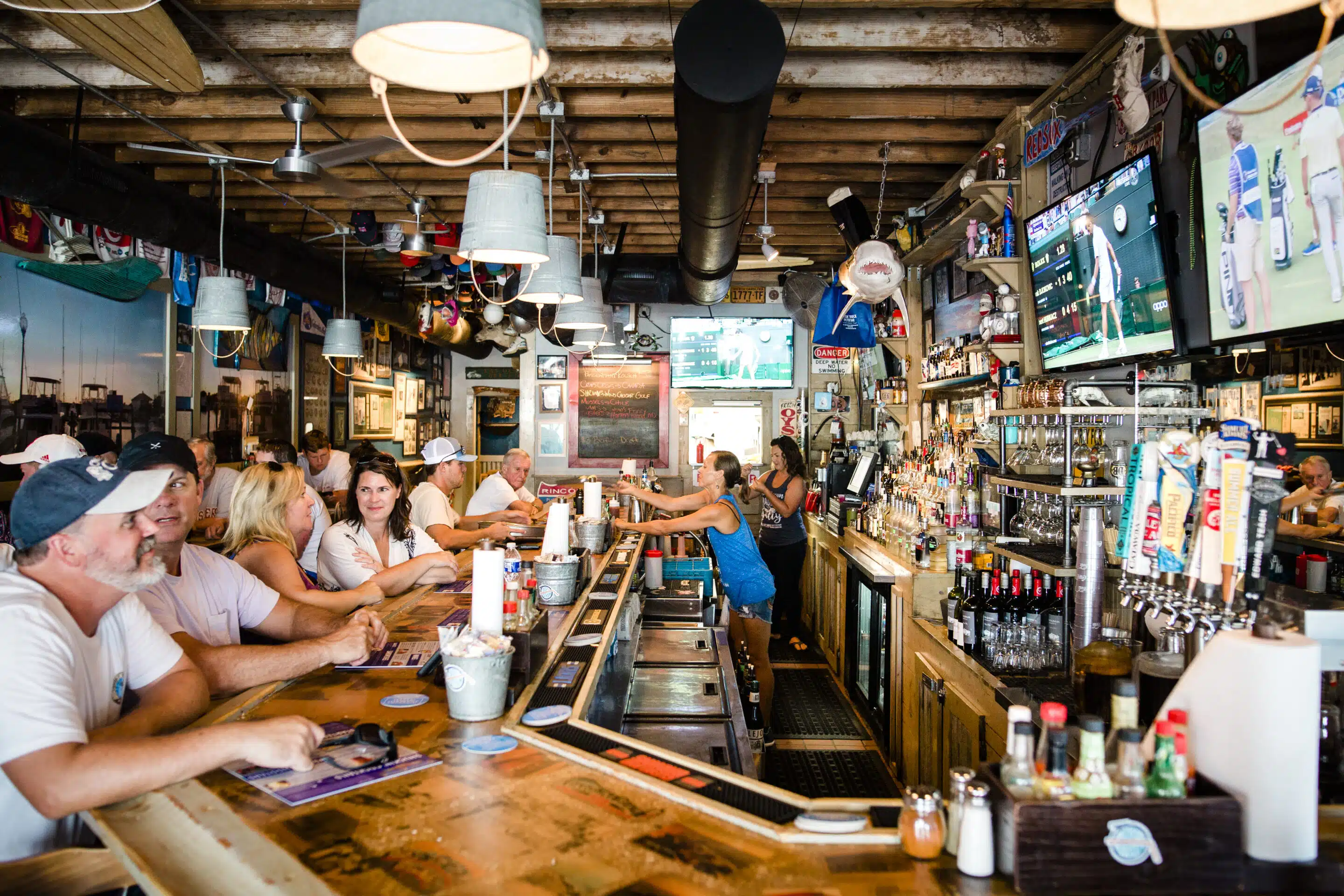
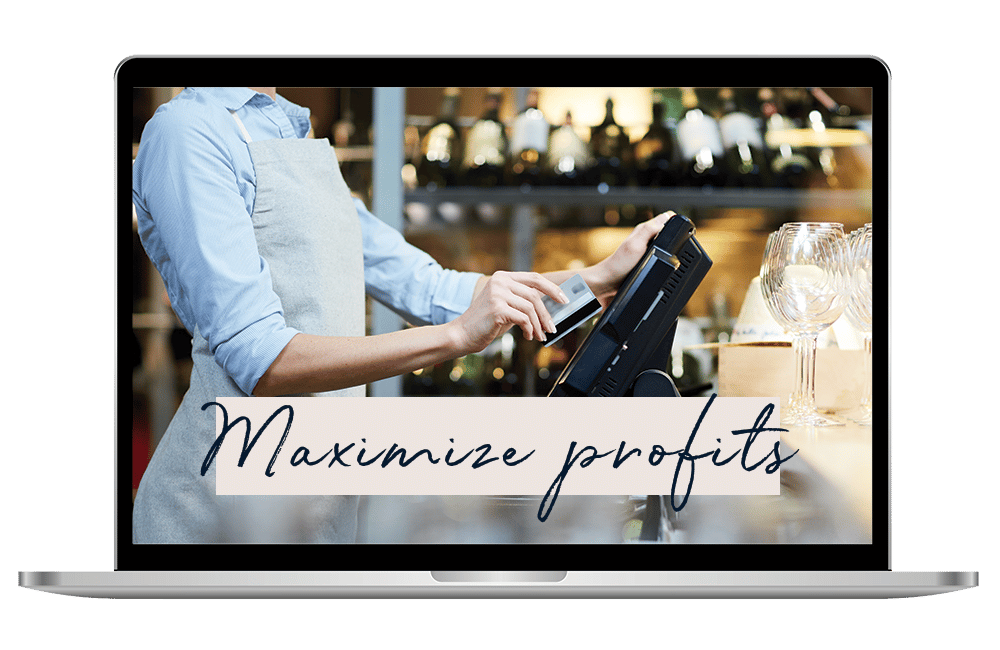
The three costly mistakes you could unknowingly be making?
Find out in this FREE guide and restaurant assessment specifically designed to reveal the unexpected hurdles standing between you and exponential business growth.
Thank You To Our Sponsors
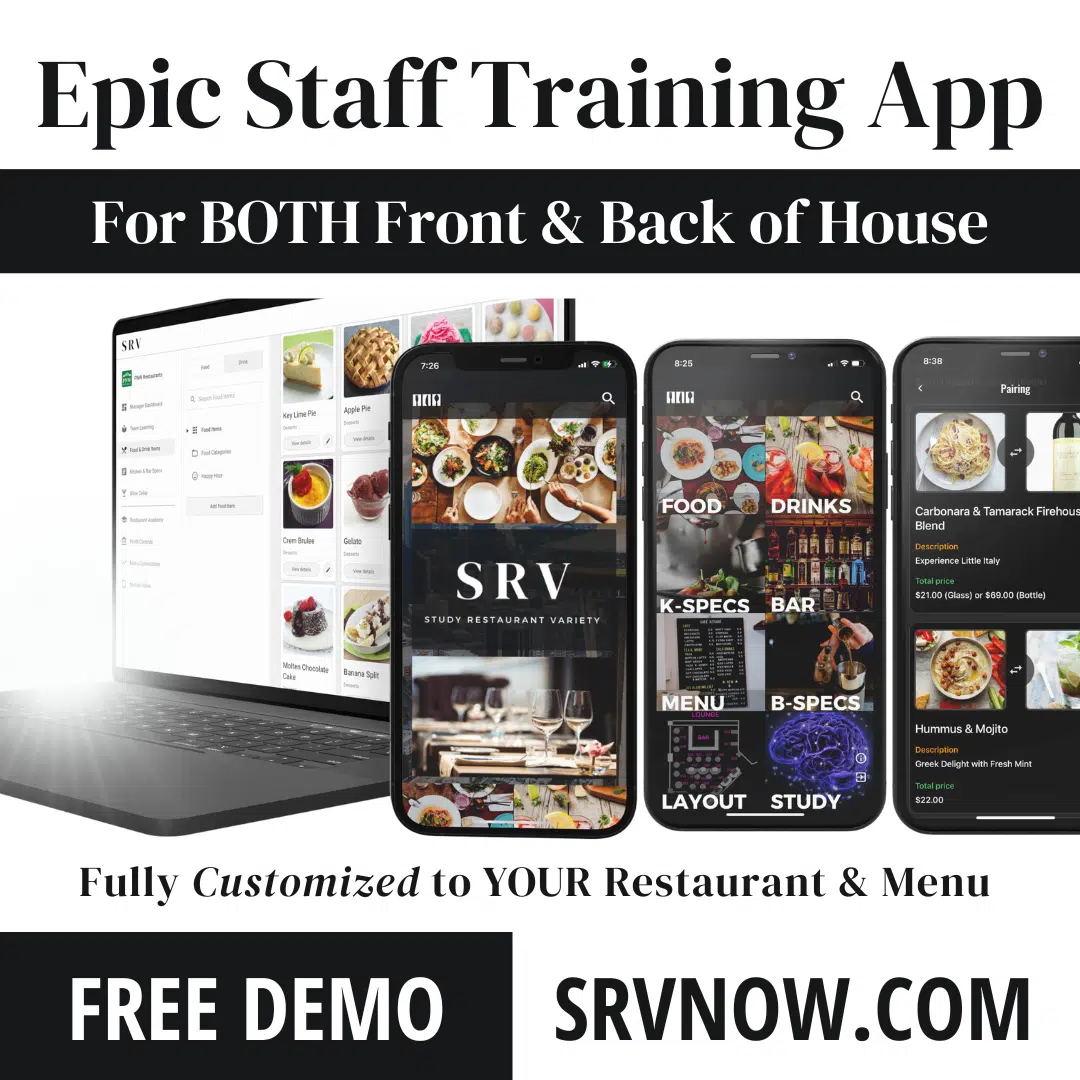

The Employee Retention Tax Credit We will help you determine your eligibility for 2020 & 2021 - Get Started
For a limited time only, popmenu is offering our listeners $100 off your first month plus an unchanging lifetime rate.
Request a DEMO:
Want to become a podcast sponsor?
Please get in touch with Roger at roger@restaurantrockstars.com
